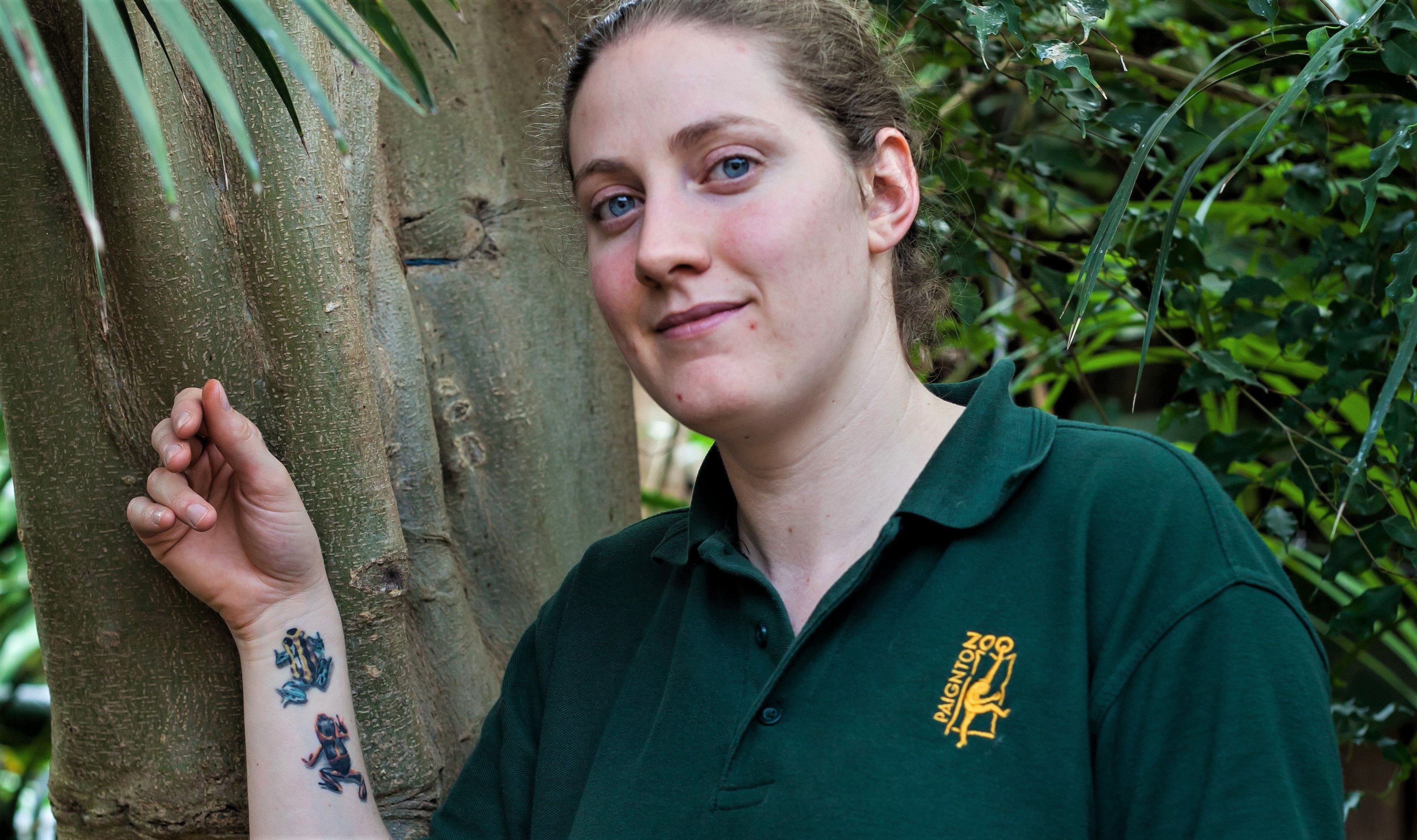My job is incredibly varied from one day to the next. I work with the amphibians, reptiles and invertebrates at Paignton Zoo.
An average day involves cleaning, feeding and caring for all these animals from small frogs to large crocodiles.
A day in the life of a zookeeper
Some of the things we do in a typical day include:
- Increasing enrichment for the animals such as giving frozen watermelons to the giant tortoises
- Training our mangrove monitor who will follow a target stick into his crate so we are able to safely work with him
- Putting up new enclosures from designing them through to putting the animals into their new homes
- Monitoring the parameters to ensure they are suitable for the animals.
Why frogs?
My real passion has always been frogs.
As a kid, I used to catch them and take them home with me, much to my mother’s horror.
I was very lucky to get the opportunity at university to study frogs out in Peru. That’s where my passion for their research and conservation really developed into the career I have today.
What I studied
At school, I did a range of GCSEs including the usual maths, English and science as well as geography, art, PE and ICT.
When I went to college I studied geography, biology and environmental sciences.
I then went on to study Wildlife Conservation at the University of Kent. Through my undergraduate degree, I was very passionate about my local wildlife and volunteered a lot with local wildlife groups.
Read more: What it’s like to work as a scientist studying bees
This gave me many research and conservation skills. I was extremely lucky following this to get the opportunity to continue my research by undertaking a PhD in biodiversity management.
Volunteering
Whilst all this education has been instrumental in getting me to where I am, I would like to point out that even after undertaking a PhD I still had to volunteer at Chester Zoo to gain valuable experience to allow me to get a job.
Never underestimate how important volunteering is in the zoo world. It gives you valuable skills and the experience you need to be successful.
Variety is the spice of life
No two days are the same. I love how varied my job is, and as a team, we are continually being challenged and are constantly learning.
I enjoy the success of breeding a new species and then passing this knowledge on to other zoos and experts to further the conservation of these species.
Working with the public
Another thing I also really enjoy is engaging with the public and telling them about the species I work with and how important the work we do is.
I get a lot of job satisfaction on a daily basis. Highlights for me include working with amazing species such as the Atelopus toads – which as a group of species are extremely endangered – and getting a Komodo dragon at Paignton Zoo.
I have also had some amazing opportunities to travel, visiting Panama, Montserrat, Peru, Costa Rica and Canada and giving many presentations at conferences to share my work and findings with my peers.
Working as a zookeeper
I love working at Paignton Zoo. I have a great team who I really enjoy working with. There is a great team spirit at the zoo with different departments helping and assisting each other on a daily basis.
The collection I get to work with is also very rewarding and interesting and I love coming into work every day.
Our Amphibian Ark is a fantastic facility. We have many exciting plans for the future and want Paignton Zoo to become one of the key players in amphibian conservation.
If you want to be a zookeeper
Try to get as much experience as possible. Many zoos take on volunteers, and there are other charities and pet shops.
Experience is key, as there will always be lots of people applying for the same job so you need something to make you stand out from the crowd.
Amphibians are threatened globally, with so many species at risk of extinction in the wild.
Luckily, we are in a position to be able to do something about it. We can recreate the natural environments of different amphibians in miniature and simulate their natural weather conditions like sunlight, rainfall and humidity. It’s easier to do this for amphibians than for rhinos and tigers.
Conservation is a passion
Personally, I don’t feel that conservation is a career, it is more something you do throughout your life because you feel passionate about it.
I love working in the zoo world. Having worked in other sectors, I have always found the zoo community to be a very enjoyable place to work. Everyone clubs together to get things done.
My belief is that having a shared passion for conservation and the animals we work with helps.
And finally
Don’t give up. Attend training courses, conferences, events, volunteer, join local groups and talk to people. You never know who you will meet or what opportunities might come your way.
For more information on Paignton Zoo go to www.paigntonzoo.org.uk or ring 01803 697500.
